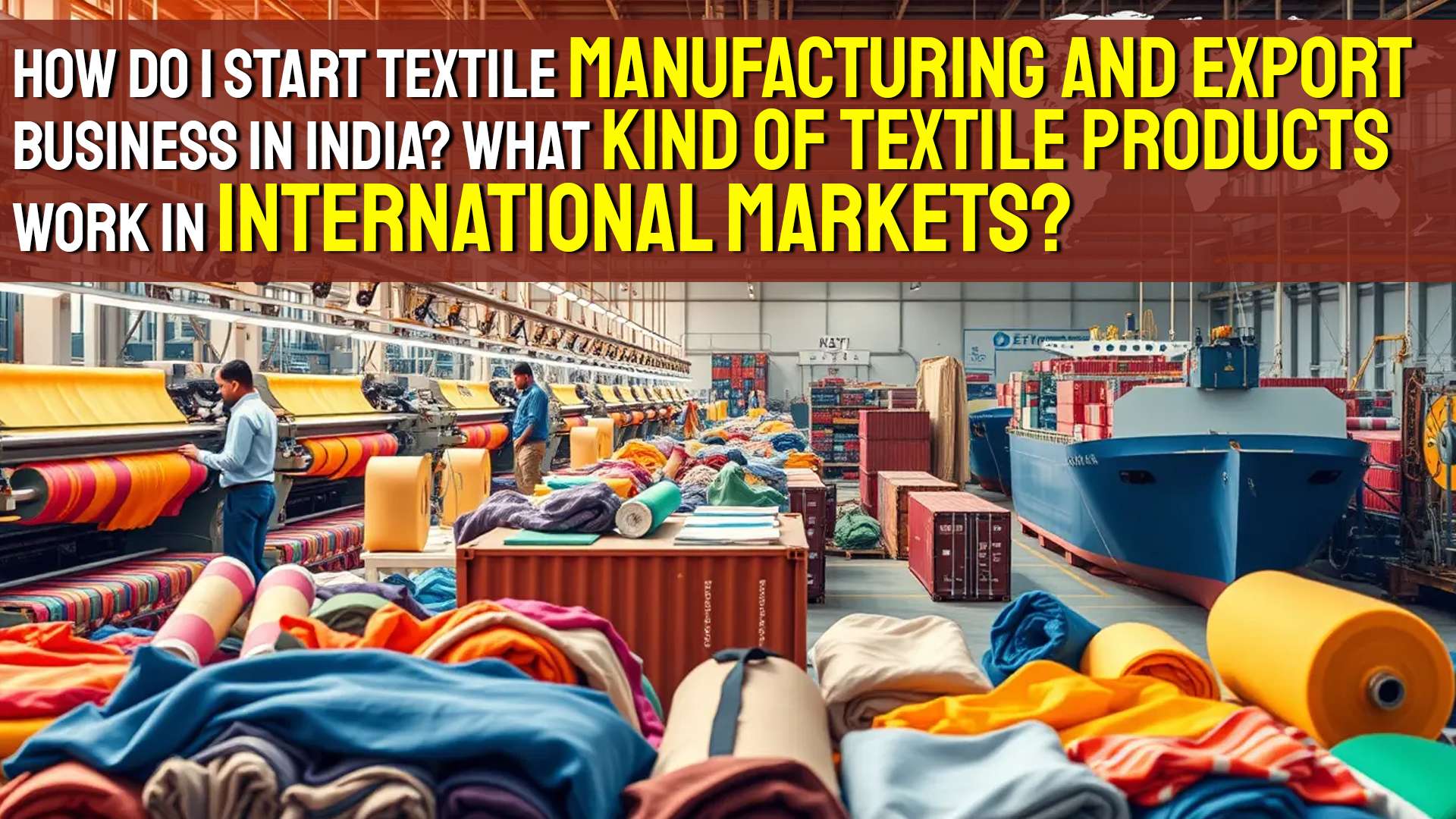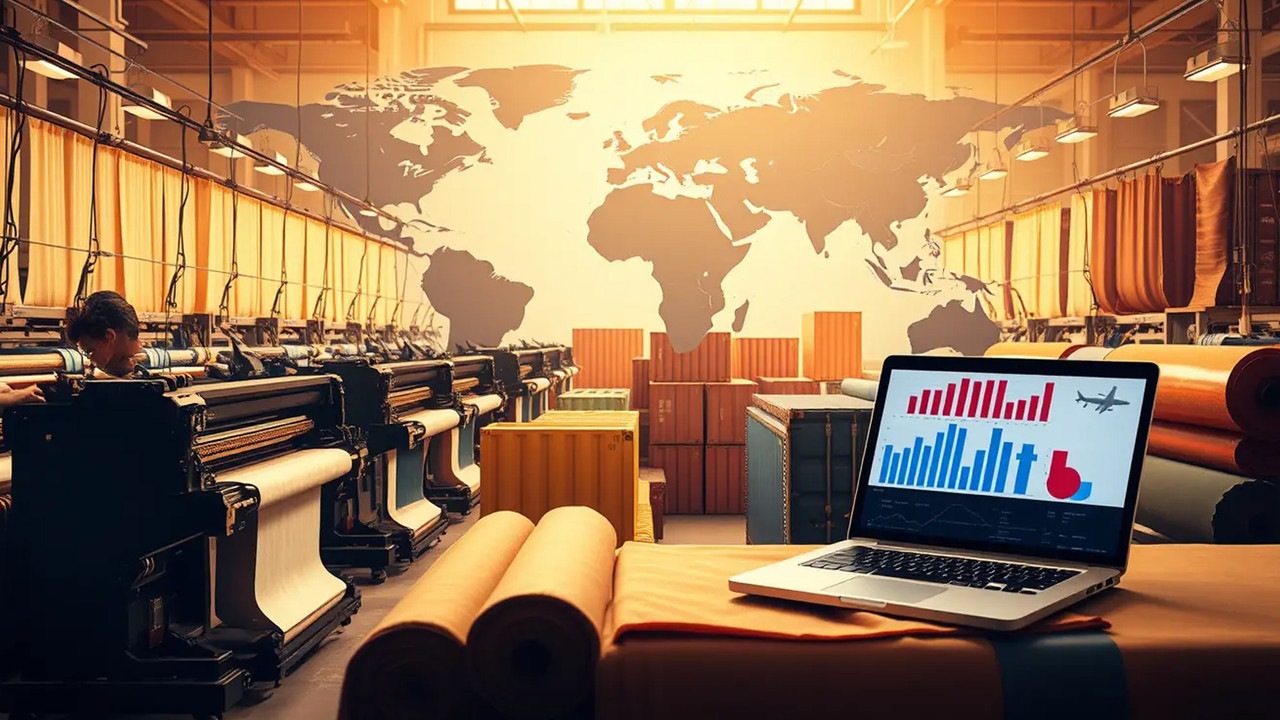How do I start a textile manufacturing and export business in India?

Share Blog:
Introduction
The Indian textile industry is one of the largest sectors in the country. It plays an important role in employment, income, and exports. India's leading wholesale fabric manufacturer and B2B textile exporter has established a strong presence in the global market. The industry's rich heritage, combined with modern manufacturing capabilities, provides profitable opportunities for entrepreneurs. The diverse nature of the sector includes everything from traditional handloom operations to modern manufacturing plants. This makes it an attractive opportunity for investment and business models at scale
The Indian textile industry operates in several segments. It creates many business opportunities. Textile importers and exporters play an important role in facilitating international trade. Meanwhile, wholesale fabric manufacturers focus on both domestic and global markets. The domestic market shows strong demand in all categories from basic to luxury textiles. In the past few years, significant changes have occurred in the management of retail stores and branded apparel which creates new opportunities for the manufacturer The export market is equally promising, with Indian textiles being preferred globally for their quality and craftsmanship. The sector's strength lies in its entire value chain. From fiber production to ready-made garments all within the country. This vertical integration offers unique benefits to businesses looking to establish themselves in this sector.

Prerequisites for starting a business
Starting a textile manufacturing export business requires careful attention to legal and infrastructural requirements. Proper documentation and compliance are essential for B2B textile exporters from India. Legally, entrepreneurs should start with proper business registration and choose between a limited company, LLP, or proprietorship structure. Depending on the size of the business and its plans, GST registration and Import Export Code (IEC) are required for international business operations. Additionally, membership in relevant textile associations can provide available networking opportunities and industry value and insights
Infrastructure management requires careful consideration of space, utilities, and equipment. Manufacturing units generally require sufficient space for machinery installation, storage, and worker movement. Modern textile units require a reliable power supply system with redundancy to ensure uninterrupted production. Water treatment facilities are essential to processing operations. Meanwhile, quality control laboratories ensure that product standards are consistently maintained.
Financial Planning
Financial planning is the key to a successful clothing business. The initial investment structure typically involves the allocation of key fixed assets such as land, buildings, and machinery. Working capital requirements should be carefully calculated for smooth operations, considering the cyclical nature of the industry and payment conditions. Operating costs include the purchase of raw materials. This is typically the largest recurring cost followed by wages and utility costs. Entrepreneurs must also consider marketing and logistics costs. This is especially true when targeting export markets.
Developing an export business requires thorough market research and strategic planning. Successful exporters take time to understand their needs. Documentation is important in export processing for quality requirements and price changes in the target market. Therefore, meticulous attention to detail is required in managing letters of credit, transportation documents, and insurance policies. Building relationships with international buyers often begins with participating in trade shows and exhibitions. It provides a platform for showcasing products and directly understanding market needs

For Franchisee Inquiry, Call: +9163521 77288
Quality control and standards
A comprehensive quality management approach is essential in textile manufacturing. International certifications such as ISO 9001:2015 and GOTS are becoming increasingly important to access the global market. A strong quality management system should cover all aspects of production, from raw material testing to final product inspection. This includes implementing standard operating procedures, training quality control personnel, and detailed documentation on quality parameters.
Ajmera Fashion has created an innovative business model that addresses common barriers to entry in the textile industry. Their approach focuses on providing aspiring entrepreneurial women with a structured way to establish their presence in the fashion industry without needing to make a large initial investment. The company's model emphasizes flexibility and scalability. It allows partners to grow their businesses at their own pace. At the same time, it takes advantage of the established supply chain and quality assurance system.
Let's start with Ajmera Fashion
Partnering with Ajmera Fashion begins with a comprehensive consultation to understand the potential partner's business goals and capabilities. The company provides detailed business planning support, helps new entrepreneurs identify their target market, and develops effective strategies. Field allocation ensures that partner protection is marketed, while ongoing training and support help maintain operational excellence.
Success Strategy
Success in the textile industry requires a balanced approach to market positioning. Operational and marketing excellence often develop unique product lines that set them apart from their competitors while maintaining consistent quality standards. Operational excellence focuses on efficient inventory management and production processes. It is supported by well-trained staff. Marketing strategies should evolve according to changing consumer needs by combining both traditional and digital channels to reach target customers.
Risk management
The textile industry faces various challenges. From fluctuating raw material prices to changes in international trade policy. Successful businesses employ comprehensive risk management strategies. This includes maintaining an adequate working capital buffer. Diversifying their product portfolio, and building strong relationships with suppliers helps ensure a stable supply of raw materials to keep up with market trends. And helps to adapt quickly to changing consumer needs.
Future trends
The future of the Indian textile industry is promising. This was supported by several positive factors. Indian wholesale clothing manufacturers and B2B clothing exporters are increasingly turning to digital technology to increase their global reach. The growing domestic market, supported by rising disposable income and changing fashion preferences, is a strong foundation for growth. Government initiatives supporting textile importers and exporters, including various plans for technology upgrading and skills development, will create an enabling environment for new investments. The increased focus on sustainable and ethical production practices opens up new opportunities.
Conclusion
Starting a textile manufacturing export business in India requires careful consideration of several factors, from legal compliance to market dynamics. Traditional routes require significant investment and infrastructure. Innovative models such as Ajmera Fashion's partnership program offer alternative routes into the industry. Success depends on maintaining high-quality standards. Understanding market needs and building strong business relationships whether choosing the traditional production route or the cooperative model, proper preparation and continuous adaptation to market demands remain the keys to long-term success in this dynamic industry
Frequently Asked Questions
Q: How can I start working with a wholesale clothing manufacturer in India?
A: Research founding a manufacturer. Obtain the necessary business licenses and attend textile exhibitions Establishing direct relationships with manufacturers often requires minimal order quantities and appropriate business documentation.
Q: What are the requirements to become a B2B textile exporter from India?
A: The main requirements include Import-Export Code (IEC), GST registration, and building relationships with manufacturers. Understanding International Trade Compliance and maintaining quality control standards…
Q: How do textile importers and exporters manage quality control?
A: They use strict quality management systems. Conduct factory inspections regularly. Inspection before shipping and maintain international certifications such as ISO 9001:2015 and GOTS.
Q: What are the minimum investment requirements for starting a textile export business?
A: The investment requirements vary depending on the business model. But they generally include inventory costs, logistics, documentation, marketing, and working capital costs. Shared models like Ajmera Fashion offer fewer initial investment options.
Q: How can I find a reliable textile importer and exporter for my business?
A: Use a trade directory. Attend international trade fairs Join the Textile Association and leverage online B2B platforms, verifying credentials through business references and government databases.

For Franchisee Enquiry, Call: +9163521 77288
Also Read...





